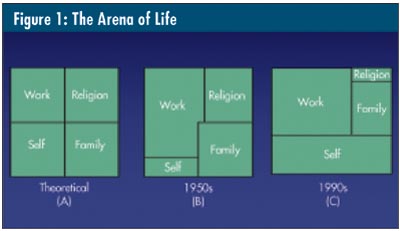Hole in the Heart or Hole in the Head?
An organization can excel only when it taps the full potential of all the individuals who work there, sparking their creative potential and providing them with a high degree of self-worth and pride. Individuals perform superbly not because they're driven to perform by promises, threats or praise, but because excelling in their chosen jobs provides personal satisfaction and fulfillment.
Don't fool yourself. The job you have today is your chosen job. Most of us had options and career choices to make as we first entered the work force, and we still have options available to us today. You can choose to leave your present assignment and work in a fast-food restaurant. It's you who decides to continue doing what you're doing. You must accept your responsibility to excel at your job. Too many of us are unwilling to put forth the additional effort that's required to have the best options available. The only exceptions to this are the few people who are limited physically or mentally. The rest of us have no excuse. We have freedom of choice. We need to weigh the consequences of our decisions and live with them.
As Martin Luther King Jr. put it, "If a man is called to be a street sweeper, he should sweep streets even as Michelangelo painted, Beethoven composed music or Shakespeare wrote poetry. He should sweep streets so well that the host of heaven and earth will pause to say, 'Here lived a great street sweeper who did his job well.'"
For employees to perform effectively, management must provide them with training, tools and time. The three Ts get the employee to the starting gate. They're required for an employee to perform well. To excel, an individual has to build upon these basics using individual creativity, pride and sacrifice. The trick is to build personal challenges into your present job that will throw off the chains of boredom and mediocrity. What could be a more boring task than hitting a walnut with a stick, then running after it and hitting it again eight hours a day? Well, put eighteen holes in the ground and that boring task becomes golf, a sport that millions of people pay lots of money to play.
I'm not suggesting that any individual invest his or her entire life in work. Everyone needs to spend time in each quadrant of the life's arena, as seen in the figure above.
For a typical person, a theoretical distribution of time is shown in box A. In this situation, all four quadrants are balanced, but theory and practice are very different. Box B reflects how the four quadrants of a typical American's life were divided about 50 years ago. Although work was the major consumer of time, religion and family also consumed their fair shares, and little thought was given to one's personal pleasures. Box C reflects the current "typical" consumption of time. You'll note that the work quadrant hasn't decreased, although we've invented many ways to decrease our workloads. The major change that's occurred is that the self quadrant has grown significantly at the sacrifice of spending time on religion and family. We're spending more time eating alone, surfing the Internet, listening to our iPods or watching TV, and less time at church, or talking to our spouse and sons and daughters. Many of us have little or no time for our fathers and mothers.

Individuals need to define the correct balance between the individual quadrants. Well-adjusted people can't devote all their efforts to any one quadrant if they want to live a healthy life. Employees who spend too much time at their workplace soon burn out and lose their individual creativity. Because of the overemphasis on the work quadrant in Japan, a firm called Japan Efficiency Headquarters rents out actors to visit the parents and children of people who are too busy with their careers to do it personally. The Tokyo-based organization charges $385 for a five-hour visit by one person, $769 for a couple, and $1,155 if the client also wants to rent a baby or child. For example, a 35-year-old Tokyo computer salesman sent a couple to visit his 64-year-old father who lived ten minutes away from him. "Our purpose is to fill a hole in the heart," says company president Satsuki Oiwa.
What's happened to us? Have we lost our way?
H. James Harrington is CEO of the Harrington Institute Inc. and chairman of the board of Harrington Group. He has more than 55 years of experience as a quality professional and is the author of 26 books. Visit his Web site at www.harrington-institute.com.
|